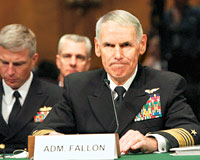
7 March 2008
The top US commander in the Middle East has suggested that dialogue between Ankara and the outlawed Kurdistan Workers' Party (PKK) would solve Turkey's problem with terrorism, a strong sign that an earlier call for talks with the PKK from a senior US commander was not a slip of tongue.

"They certainly have instigated lots of trouble, and they've had a lot of casualties in Turkey but the real solution here, to me, is that there's some kind of accommodation reached with this group and with the Turks inside of Turkey, to knock this off," Adm. William J. Fallon, commander of the US Central Command, told a House of Representatives committee hearing on Wednesday. "We certainly recognize the pain the Turks have felt from the outlawed and terrorist activities of this group, but we know that the long-term solution is some kind of an accommodation."
Fallon's remarks came a day after a former senior US commander in Iraq, Army Lt. Gen. Ray Odierno, said negotiations could be conducted with the PKK after a certain period of pressure on the group. "I believe that the long-term solution in northern Iraq is not a military one. And so -- but obviously there's pressure that has to be put on them, so we can start to talk and have negotiations with these terrorist elements," Odierno, who was second in command in Iraq for 15 months until he returned home in mid-February, said.
Turkey and the United States have managed to ease troubles in their ties after Washington promised to actively help Ankara in its fight against the PKK, considered a terrorist group by Turkey, the United States and the European Union. But US commanders' calls for talks with the PKK are unlikely to be welcome in Ankara, which rejects outright any sort of dialogue with a terrorist group.
Fallon confirmed that the United States assisted Turkey in its recent cross-border offensives against the PKK in northern Iraq. The Turkish military has carried out several aerial offensives against the PKK targets in northern Iraq since Dec. 16. They were followed by the eight-day ground offensive, the biggest anti-PKK operation in a decade. "We provided indirect support to Turkish military intelligence, helped the incursion achieve some tactical success," Fallon said, when asked whether the ground offensive by Turkish troops, which ended on Feb. 29, was done with US assistance, at the House session.
He however repeated that the "real key issue here is figuring out a way to have the Turks come to grips with this -- the KGK, and to not just try to eliminate them militarily." KGK stands for Kongra-Gel, another name for the PKK. "We certainly recognize the pain the Turks have felt from the outlawed and terrorist activities of this group, but we know that the long-term solution is some kind of an accommodation, to scratch some of the itches of the KGK. And so we'll give them the help that we can, but we're really strongly encouraging them to figure out a political solution here," he added.
US officials have long called for non-military measures to address the PKK problem. The Turkish government has said it was planning such measures to help the dissolution of the terrorist group but categorically rejects any prospects for dialogue with the PKK.
US Defense Secretary Robert Gates, who visited Ankara last week, said at a media roundtable at the Pentagon on Wednesday that he and the Turkish officials he met in Ankara "talked a great deal about the importance of accompanying the security measures to go after the PKK terrorists with efforts to try and address some of the civilian concerns among the Kurdish population, where the PKK recruits people. And I think that both President [Abdullah] Gül and Prime Minister [Recep Tayyip] Erdoğan have put forward proposals in the cultural, economic and political arenas to begin doing that."
He was responding on Wednesday to a question, based on Odierno's remarks, over whether the United States has a policy to have talks with the PKK. He said: "I don't think that anybody -- certainly nobody I talk to -- was of a mind to have any conversations with the PKK. I think that the real objective is to peel away from the hard-core terrorists, those who might be reconciled and brought back into the political fold."
Despite growing calls for a "political solution" from the Pentagon, the State Department has so far avoided making any statement. Responding to a question on the issue, State Department deputy spokesman Tom Casey said: "We continue to urge Turkey and the government of Iraq to work with one another to confront the challenge posed by the PKK. I know there are discussions that go on on a variety of different levels on that, but certainly there's a lot more work to do before we can end this threat to both Iraq and Turkey."


